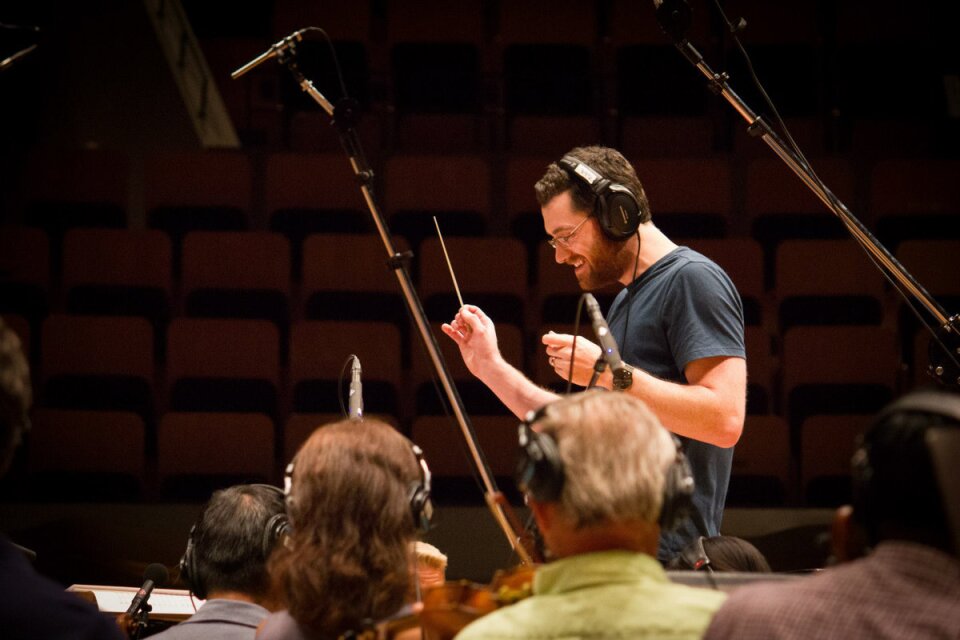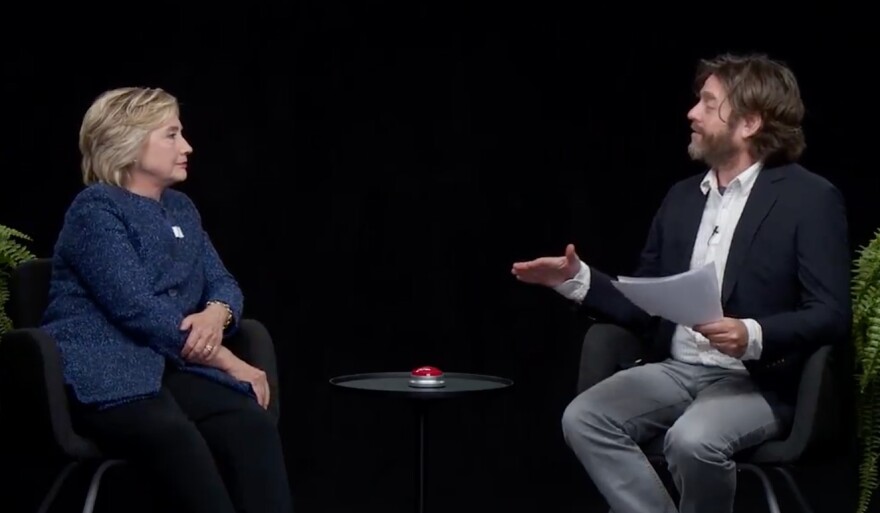The success of "Between Two Ferns" with Hillary Clinton explains why Funny or Die opened a bureau in the nation's capitol; a new state bill aims to prevent websites like IMDb from publishing the age of actors and actresses; Grammy nominee Austin Wintory composed the music for the new video game, "Abzu."
'ABZÛ' composer Austin Wintory on his ambitious video game score
Composing for film and video games wasn't Austin Wintory's first career choice. "I wanted to be a novelist," Wintory says. "Storytelling has always been at the forefront of my thinking."

Wintory was inspired by composers and old film scores when he was younger, which ultimately led him to study music at University of Southern California. It was there that he met video game designer Jenova Chen. The two worked on a game called "Flow" for Chen's college thesis, which eventually was released on the PlayStation platform and launched both Chen and Wintory's career in the video game world.
Since then, Wintory has scored many films and video games. And he received a Grammy Award nomination for his work on "Journey," which was also designed by Chen. Wintory was the first composer to be nominated for a Grammy in the Visual Media category for a video game score.
This year, he scored two video games, one of which is the underwater indie game "ABZÛ." There are no bad guys, no missions to solve, and players don't die in the game. It's simply a game where you explore the ocean and all the animals and treasures it has to offer. Wintory describes it as a game "about the dream of scuba-diving more than the realities of scuba diving."
The Frame's James Kim spoke with Austin Wintory about how he went about writing the score for "ABZÛ," his instrumentation for the score, and why he constantly pushes himself musically and creatively.
INTERVIEW HIGHLIGHTS:
On the music inspiring the gameplay in "ABZÛ":
There's a moment in the game where you see the diver swimming in this diagonal alongside these giant blue whales. That was completely and totally designed around the music. I wrote it first based on what Matt Nava, our creative director, said he was envisioning for the scene, but just purely a verbal description. So I wrote this grand waltz because I was picturing this glorious scene of dancing with these incredible and majestic blue whales.
On going big and composing for seven harps in the game's score:
I'm a fan of unique and interesting colors. I'm also a fan of taking seemingly very normal colors and blowing them out into absurd proportion. For example, on "ABZÛ," I knew I wanted the rolling texting of the harp in the score. There's a thing they do that's called a bisbigliando, which is this continuous rustling of their strings that is a very attractive sound.
But I thought, What if it's not one or two, but it's like a crowd of harps doing those kinds of gestures? So I had seven harps on "ABZÛ" that we recorded in London. It's a very normal sound, but seven of them is a little bit of a different animal.

On constantly striving to push himself:
I tend to beat up on myself really hard when I'm working because I ask myself questions like, Does this music have to exist? I know this sounds extremely lofty and probably cheesy, but I ask myself, Does this music actually contribute to the world being better? Because if it doesn't, then it's probably some form of masturbation, and who needs that?
The point is that, if I'm just writing music as a form of self-aggrandizing, it's not doing anybody any good. For me, the inspiration to push myself is always in the form of, Is this worth having written? Meaning, is it worth someone's time to listen to?
"ABZÛ" is currently available on PlayStation 4 and Steam.
'Funny or Die' wants to make PSAs people 'actually want to watch'
Can humor be found in our nation’s capitol? Brad Jenkins, who runs the Washington office of Funny or Die certainly thinks so.
The most recent episode of "Between Two Ferns" had the highest first-day viewership in the history of Funny or Die, with more than 30 million views. The success comes in part from Jenkins, who formerly worked in the White House's public engagement office in the Obama administration.
When Funny or Die opened its D.C. branch last year, The Frame's John Horn went to the nation's capitol to chat with Jenkins. He explained how the company has partnered with institutions such as The American Heart Association in order to create public service announcements that are both entertaining and informative.
Interview Highlights:
You have a belief, and I'm quoting you now, that "Laughter crosses party lines. If it's a funny joke, it's a funny joke. It doesn't matter if you're a Republican, Democrat or a Libertarian." What do you mean by that?
The biggest challenge in our office was we had to work with a Congress that was pretty hostile to a lot of the President's priorities. Even on issues where there was bipartisan support, Republicans had to figure out a way to sell it to their base, which didn't really like the White House particularly much. So, one of the jobs we had was trying to find unique allies, trying to find messengers and trying to find, in some cases, advocacy groups who spoke to a constituency much better than we. And using humor on an issue that can sometimes be hard to swallow — sometimes a partisan issue — was something that we had tremendous success with, particularly with using a lot of the attacks against the president as tropes to really push back and make light of the view of the president from the other side.
Issues and comedy to a lot of people would not seem to go naturally hand-in-hand. Issues are, by definition, serious subjects and comedy [is] unserious. How do you figure out a way to marry the two and have something that's entertaining and comedic, but also is talking about something that the creators believe is important to the nation?
Funny or Die was started by Will Ferrell and Adam McKay. They came from that SNL background where they're able to, in a week's time, put together the most-watched live program. And much of it was on what's happening in the country and what's happening in the world. So Funny or Die has always had that mindset of finding issues that are happening around us because, in some cases, this town could use some humor. There are some really great public servants, some really great advocates and members of Congress that are doing a lot of good, but there's a lot that's dysfunctional and that's not working in this town. There's a lot of frustration on inaction on issues that pretty much every American agrees on. Humor can be used to speak truth to power. I think it's a lot more engaging and compelling when you can use comedy to poke fun at things that aren't working. Sometimes you need humor for people to pay attention to issues that are under the radar. That's what we're doing here in D.C.
Our writers have a certain perspective on the world and we're unabashed about that. But when it comes down to whether we're propaganda or just doing things because we believe in issues — that couldn't be further from the truth. Our job is to be funny. If those issues somehow align with humor, we're always open to explore them.
Do you think people react to an issue presented in a comic way differently than they would react if it were presented in a dramatic way?
Comedy is a great entry point. There are a lot of PSAs that this town churns out, and about 99 percent of them are melodramatic. Particularly for young people, we are so challenged. In a different era, we had four television channels and a couple of radio stations, and if you were able to get your spot up on the air, people were going to watch it. It's a brave new world. Kids aren't even watching television anymore. They're not watching commercials. They have Netflix subscriptions and they have Hulu Plus subscriptions. One of the things that we think about is, How do you create content that young people actually want to watch? Not many people are seeking out PSAs to watch. I think they come across a PSA and it makes them think. But we know there are so many other competing mediums: Vine, Instagram and Facebook. How do you create content that is educational, that's inspiring, that's engaging, that people are actually seeking out? With "Between Two Ferns," the amazing thing is, people were Google searching "Between Two Ferns Obama." They were seeking out, in many ways, an advertisement for Obamacare. That's the type of work that we want to be doing.




